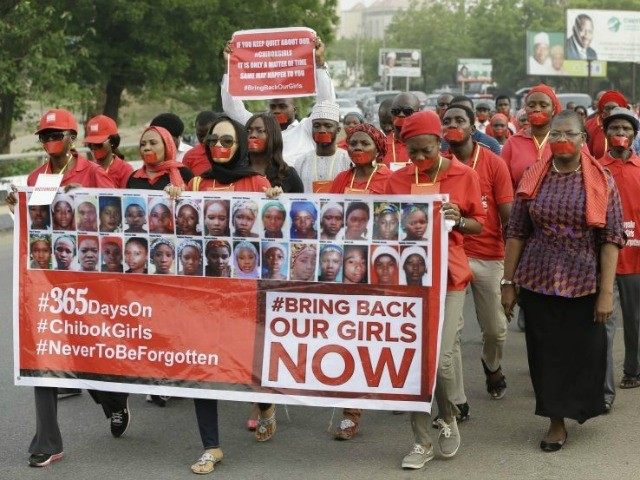The Nigerian government has been saying Boko Haram is defeated, but on Wednesday, a triple bomb attack killed 13 and wounded 30 in the town of Chibok, the scene of Boko Haram’s infamous 2014 mass kidnapping of hundreds of schoolgirls, source of the utterly ineffective #BringBackOurGirls hashtag campaign.
CNN’s report does not clearly finger the ISIS-affiliated Boko Haram as perpetrators of the grisly attack, whose death toll may yet rise, because 21 of the 30 injured are said to be “critically wounded.” Two victims who survived the initial attack have since succumbed to their wounds.
“In the first bombing, which targeted a military checkpoint outside the town, a young boy detonated his explosives around midday as soldiers and civilians were searching vehicles and passengers arriving into the town,” CNN reports, citing Bitrus Aboki, “a civilian who’s helping the military protect the town against Boko Haram, a militant Islamic terror group.”
If civilian militia are working with the military to protect Chibok from Boko Haram, then the savage ISIS-affiliated terrorist gang is not as “defeated” as Nigerian officials would prefer.
The boy bomber’s initial attack was followed by “a second blast by a female bomber in the middle of the market as traders were attending to customers,” and then a third detonation from another female bomber confronted by local residents when they saw her carrying explosives.
The Sydney Morning Herald reported “no immediate claim of responsibility” on Thursday, but added the attack “bore the hallmarks of Boko Haram, which has been using suicide bombers since the army expelled the group from much of the northern territory it had captured previously.”
The Herald sees Boko Haram as greatly diminished by military operations from Nigeria, Chad, Niger, and Cameroon, which have recaptured most of the territory ruled by the terror gang at its peak.
However, Boko Haram is not totally out of the fight yet, “raiding villages for provisions or hitting soft targets, such as places of worship and markets,” mostly around Lake Chad and the Sambisa forest, long described as a redoubt from which rooting hidden militants would be extremely difficult.
AFP is more firm in describing the Chibok attack as the work of Boko Haram, quoting residents who say the town is overcome by a “climate of fear,” with people hiding in their homes or fleeing into the bush.
Other recent attacks blamed on Boko Haram include raids on small villages that killed at least 15 people, and a bomb attack in Cameroon—also a coordinated effort by three suicide bombers—that killed 32 victims on Monday.

COMMENTS
Please let us know if you're having issues with commenting.